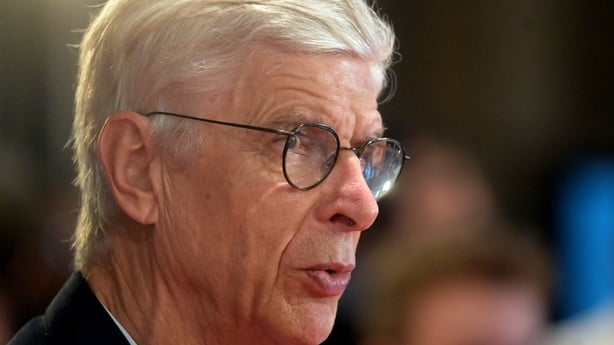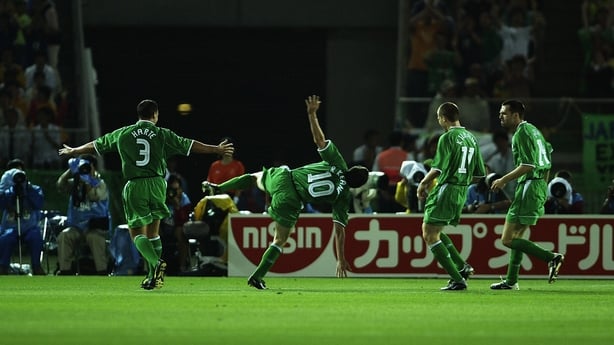France's victory last night means we're down to just two more games at this year's World Cup.
Sunday's final holds massive promise with Lionel Messi looking to write the perfect ending to his time with Argentina by winning the game's biggest prize.
France can become the first team since Brazil in 1962 to do back to back titles, and in doing so, continue Europe's domination of the tournament stretching to Italy's win in 2006.
It's around this time every tournament that we start to consider the future, and whether the Republic of Ireland might finally return to the biggest stage, after being spoiled between 1990 and 2002.
But what does the road to Canada, Mexico and the United States in 2026 hold?
We need your consent to load this rte-player contentWe use rte-player to manage extra content that can set cookies on your device and collect data about your activity. Please review their details and accept them to load the content.Manage Preferences
The group stages in Qatar, with 32 teams involved, delivered exciting football with only Canada and the hosts mathematically out of the running for a last-16 spot ahead of the final round of matches.
It is the last time that a finals will be run off in this way, with 16 more teams - 48 in total - qualifying for the tournament in 2026.
As things stand it will mean 16 groups of three, with a guarantee of two games - rather than the current three - for qualified teams. But it also means the final group game taking place as a stand alone fixture, greatly increasing the risk of dead rubber games.
At the 1982 World Cup, a match between West Germany and Austria - later dubbed the Disgrace of Gijon - saw the Germans scoring early before going on to win 1-0 in a result that suited both teams. Neither team needed to score, and neither properly attempted it for the 80 minutes, or so, after Horst Hrubesch broke the deadlock for the Germans.
Both teams went through, Algeria's protests fell on deaf ears as they were eliminated, and the sour taste left behind led to future concluding group games being played at the same time by the time the World Cup visited Mexico in 1986.
With a standalone fixture set to conclude the groups in four years' time, could we be heading for the Disgrace of Guadalajara, Dallas or Toronto?
Not necessarily. FIFA admitted earlier this year that they were conscious of the potential for dead rubbers in 2026, with their vice president Victor Montagliani admitting in March that "it's an issue that has been raised".

More recently Arsene Wenger, FIFA's Chief of Global Football Development, acknowledged that the final format for 2026 could still be changed. The number of teams will stay at 48 because, according to the former Arsenal manager, the game will develop if more teams can realistically qualify for the game's biggest tournament.
But Wenger conceded that 16 groups of three might still face the chop.
"It means that we will have to find 16 more good teams," said Wenger.
"I am convinced that if the teams, the countries have more opportunities to go to the world stage, it will do more for development inside that country.
He added, "This [the format] is not decided but it will be 16 groups of three, 12 groups of four, or two sides of six groups of four - like you organise two 24 teams.
"I will not be able to decide that, it will be decided by FIFA and I think it will be done in the next year."
With a round of 32 set to be included in 2026, 12 groups of four, with the top two going through, would mean that the eight best third-placed finishers would be needed to make up the shortfall for the first knockout round.
While four-team groups would reduce possibility of one-off dead rubber games to end groups, they would still leave a long wait for certain teams to discover if they've managed to make it through.
Further, with more teams involved, might the chance of a team unexpectedly going deep be less likely?
"You would imagine so," Paul Corry told the RTÉ Soccer World Cup Podcast when asked about the chances of another Morocco-type run in 2026.
"Even Croatia rode their luck to get to the semi-finals. Morocco, to go on that journey that they did, had to ride their luck.
"If you have to do that over the course of two or three more games, the toll that it's taking on the players to concentrate, play like that and be so disciplined in their shape is far more consuming than it is for a possession based team, which the top teams tend to be.
"So for a team to go to seven or eight games to get to a quarter or semi-final, it's probably less likely.
"Then again I didn't think they [Morocco] would get beyond Spain and they proved me wrong, so there's always the chance of surprises."
The elephant in the room here is the number of teams, with there being no easy way to get from 48 to either 32 or 16.
More teams will mean more games, something which is always a point of frustration for the owners of Europe's biggest clubs. While 16 groups of three is far from ideal, for all the reasons already outlined, it's still fewer matches than 12 groups of four, and thus might be considered the lesser of two evils in an already busy calendar.
But more teams participating also means more revenue for FIFA, who made more out of Qatar than any previous running of the tournament with around €7billion being earned between sponsorship and TV rights deals. Ultimately something will have to give.

While the promise of more teams qualifying increases Ireland's chances of participation - with three more European teams set to be involved - will the tournament that UEFA sides eventually participate in be a worse product? Does that matter to supporters?
"From our own point of view it's of benefit that they're extending the reach," Corry adds.
"We should absolutely be welcoming this if we're thinking about our own qualification [chances] and getting to these tournaments.
"I was against extending the Euros, against the Nations League, and to be honest I probably don't mind either of them.
"Albeit the 32 team World Cup works well, if they are to change it, and it does increase our chances, I think it's something that us as Irish people should be welcoming."
Of course an expansion of the number of teams at major tournaments and Ireland's participation comes with a health warning.
The increase of the Euros from 16 to 24 teams was seen as a near guarantee that the Boys in Green would be ever-presents in the competition, but we all know what happened at Euro 2020.
If Ireland qualify, talk of the number of teams involved will quickly be forgotten. On the other hand, if we're merely watching in four years as fans of the game, we might be waiting for the last 32 for the tournament to really come to life.
We'll move closer to knowing what way it might pan out when FIFA decides on the tournament format in 2023.
Listen to the RTÉ Soccer podcast on Apple Podcasts, Spotify or wherever you get your podcasts.








